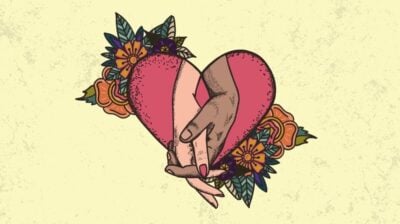What is domestic violence?
Find information on domestic violence, the difference between domestic violence and coercive control, and how to safely access specific support services.

Domestic abuse, also known as domestic violence or intimate partner abuse, refers to any incident or pattern of behaviour used to threaten, control, or intimidate a current or former intimate partner or someone living in the same household. This can be a partner you are living with but you do not have to be living together for a relationship to be abusive. The definition of domestic abuse has recently been expanded to include anyone in a less formal relationship, regardless of its duration, who behaves in a threatening or controlling manner. These behaviours can include actions or threats that harm, intimidate, harass or humiliate someone, and often a combination of both.
If you or someone you know needs immediate support, skip to our section on accessing help safely in a domestic violence situation.
In this factsheet, you will find information on:
Domestic violence as a type of abuse
Who is affected by domestic violence
The difference between domestic violence and coercive control
What the law says about coercive control in Ireland
The impact of domestic violence
How to find help for domestic violence
Is domestic violence a type of abuse?
While it has the word violence in its name, domestic violence does not have to involve physical violence. Some people refer to domestic violence as domestic abuse or intimate partner abuse, to include those who are, or were, living together. Domestic violence or domestic abuse can include any type of abuse, including physical, sexual, emotional, economic, psychological, or online abuse. Abuse can also include intimate image abuse which involves the sharing of intimate images or videos of a person without their consent. This is now a crime under Coco’s law.
Who is affected by domestic violence?
Domestic violence or abuse can affect people of all ages, sexual identities, gender identities, ethnicities, races, religions, education levels, and socioeconomic backgrounds. While abuse can happen to anyone, it most commonly happens to women by men, with 1 in 5 young women aged 18-25 being subjected to abuse by a male partner or ex-partner. In Ireland, 1 in 11 young men have been abused in an intimate relationship.
Type of relationship in which the abuse can occur
Domestic violence or abuse can happen to any person in a relationship with the person causing the abuse. This includes those currently or previously in a relationship, intimate or otherwise. Thus domestic abuse can affect a family member, adult, or child, or a current or ex-sexual or romantic partner. Domestic or intimate partner abuse is no longer limited to marital families, cohabiting partners and children. People who are dating and parents of adult children can also suffer from domestic abuse under Irish law.
Impact on people close to the person being abused
Although domestic violence may be primarily targeted at one person, it can also have a negative impact on people who are close to the survivor. This can include friends and family of the survivor, as well as other household members. Everyone who is impacted by domestic violence deserves, and may benefit greatly, from emotional support. For more on accessing support safely, skip to our section on support in a domestic violence situation.
What is the difference between domestic violence and coercive control?
Coercive control is a pattern of behaviour that is controlling and has a serious effect on the targeted person. Under Irish law, behaviour that has a serious effect is defined as:
- Causing the person to fear that violence will be used against them
or - Causing them significant alarm or distress that has a serious effect on their day-to-day activities.
Coercive control includes actions that have damaging sexual, emotional, financial, psychological effects, as well as threatening someone with those actions. When someone uses coercive control against you, they may repeatedly threaten, humiliate, assault, or intimidate you. When an intimate partner or ex-partner uses coercive control against you, they might attempt to trap you in the relationship, making it very difficult or dangerous to break up with them.
Examples of coercive control include:
- Cutting you off from your friends and family
- Trying to control when and where you go, or what you do
- Depriving you of basic needs, such as food, water, or heating
- Monitoring your online activity and/or whereabouts through your phone, laptop, or other devices
- Preventing you from accessing emotional or psychological support
- Enforcing rules that frighten, humiliate or degrade you
- Controlling your finances and blocks your access to accounts
- Threatening to release private information or photos of you
- Putting you down repeatedly (e.g., telling you that you’re worthless)
- Guilting, manipulating, or forcing you into sexual activity
What does the law say about coercive control in Ireland?
In 2019, the Domestic Violence Act 2018 was passed, making coercive control illegal in Ireland. If coercive control happened after January 1st 2019, it is a crime and can be reported.
According to the law, husbands, wives and civil partners can engage in coercive control, as well as people who are not related but have been or are currently in an intimate relationship. An “intimate relationship” in this context does not have to involve sexual or romantic intimacy.
The Domestic Violence Act 2018 provides a range of remedies for someone experiencing domestic or intimate partner abuse:
- A Barring Order
- A Safety Order
- An Interim Barring Order
- A Protection Order
- An Emergency Barring Order
The survivor of the abuse must apply for these orders, which can restrict the behaviour of the person causing the abuse in various ways, depending on how severe the abuse is. For more information, see the UCC Family Law information site.
Coercive control is a criminal offence. If you wish to report this offence, you must do so to An Garda Siochana. This may lead to criminal charges being brought against the person causing the abuse.
What is the impact of domestic or intimate partner violence?
If you or someone you know is experiencing domestic violence, it is important to know that this pattern of behaviour is not normal and can cause significant long-term harm. Everyone deserves to feel physically and emotionally safe in their close relationships.
Research shows that seeing or experiencing violence at home as a child can have long-lasting effects on both physical and mental health. Growing up around violence or coercive controlling behaviour might make it seem like this is a normal part of family life. Both children and adults who experience domestic violence may internalise verbal abuse, which can lead to negative perceptions of themselves and low self-esteem. You or the person you’re supporting might blame themselves for the abuse or believe they deserved it. It is important to remind yourself that no one deserves to be abused.
Some of the impacts domestic violence can have on survivors include:
- Increased risk of mental health difficulties: People exposed to domestic violence are at a higher risk of developing post-traumatic stress disorder (PTSD), depression, panic disorder, suicidal thoughts, and attempted suicide
- Physical health problems: Many survivors experience both physical injuries and distressing physical symptoms, such as headaches, chronic pain, pelvic pain, and digestive issues
- Pregnancy complications: Domestic violence can lead to unplanned pregnancies and complications during pregnancy
- Social isolation: Survivors may withdraw socially due to trauma, or the person causing the abuse may force a survivor to cut themselves off from others
- Internalised abuse: Different types of abuse can lead survivors to internalise negative beliefs, resulting in low self-esteem and self-blame. This, in turn, can negatively impact their other relationships
How to find help for domestic violence
If you are a survivor of domestic violence, your feelings towards the person causing the harm can be overwhelming and complex. The person causing the harm may be someone you know and love. It is possible to accept your feelings, while also recognising the pattern of threatening, controlling behaviour as harmful. Doing so can be the first step to reaching out for emotional or psychological support.
Reaching out for support can feel frightening, especially if the person causing harm has threatened to hurt you or someone you love if you speak up. However, there are ways to leave a domestic violence situation that protect your safety and reduce the risk of harm. Visit the Safe Ireland website to learn about creating a safety plan that can help.
If you are in immediate danger, call 112 or 999 to contact the Gardaí. If you are not in immediate danger, you can visit your local Garda station in person to report domestic abuse or coercive control. You can also seek legal protection to prevent your partner or ex being abusive towards you. For information on seeking legal protection from an abusive partner, visit toointoyou.ie.
Women’s Aid runs a free 24-hour National Freephone helpline for anyone who wants to talk in confidence about abuse in their relationship or the relationship of someone they know. This helpline is available on 1800 341 900. Women’s Aid also offers a telephone interpretation service in over 240 languages, and an instant messaging service. At toointoyou.ie, young people can take the Relationship Quiz, discover the red flags of abuse, learn how to help a friend and find support. If you are worried about your own or a friend’s relationship, you can use the chat support service which is free and confidential
Additional domestic violence support services
Below are some additional options you might consider for accessing support:
- People aged under 18 can contact Childline’s 24-hour helpline on 1800 666 666
- Safe Ireland supports 37 domestic abuse services located in towns across Ireland. Their services provide emotional support, counselling and advice, helping women and children to find safe accommodation, supporting them to access courts and make applications for domestic violence protection orders. Find your nearest service on the Safe Ireland website
- Men’s Aid supports male victims of domestic abuse and/or coercive control.They run a national helpline on 01 554 3811, Monday to Friday 9am to 5pm
- The Men’s Development Network operates the National Male Advice Line on 1800 816 588 for men who have experienced or are cirrently experiencing domestic violence. This service operates on Monday and Wednesday from 10am – 8pm, Tuesday and Thursday from 12pm – 8pm and Friday to Sunday and public holidays from 2pm – 6pm
- If you have been sexually abused, you can visit your nearest Rape Crisis Centre or contact the national Rape Crisis helpline on 1800 778888
- Even after the abuse has stopped, you might have emotional or self-esteem difficulties. Find out more about how counselling could help you cope with your feelings
- Boots Pharmacies offer a “Safe Space” for people experiencing domestic violence. In this confidential space, people can contact one of the 39 frontline specialist domestic abuse services across the country and access free, confidential support and advice
While domestic violence can cause significant harm to you and your loved ones, recovery and a full life after abuse is possible. Emotional and practical support from trained volunteers and professionals who understand the complexity of your situation is available.
Feeling overwhelmed and want to talk to someone?
- Get anonymous support 24/7 with our text message support service
- Connect with a trained volunteer who will listen to you, and help you to move forward feeling better
- Whatsapp us now or free-text SPUNOUT to 50808 to begin.
- Find out more about our text message support service
If you are a customer of the 48 or An Post network or cannot get through using the ‘50808’ short code please text HELLO to 086 1800 280 (standard message rates may apply). Some smaller networks do not support short codes like ‘50808’.






